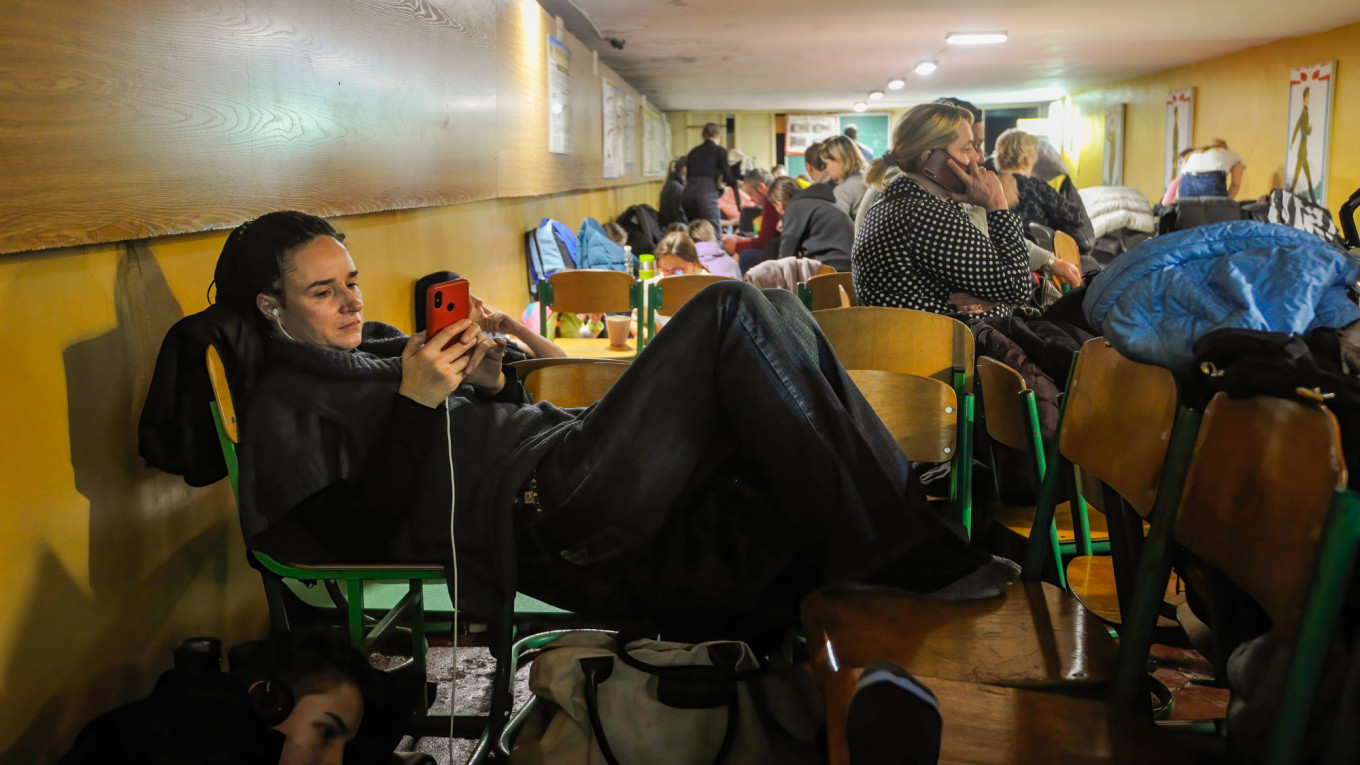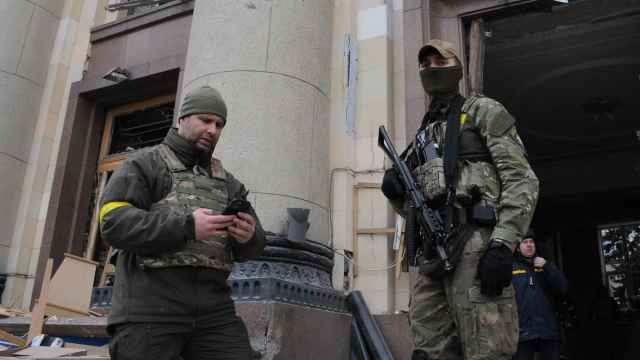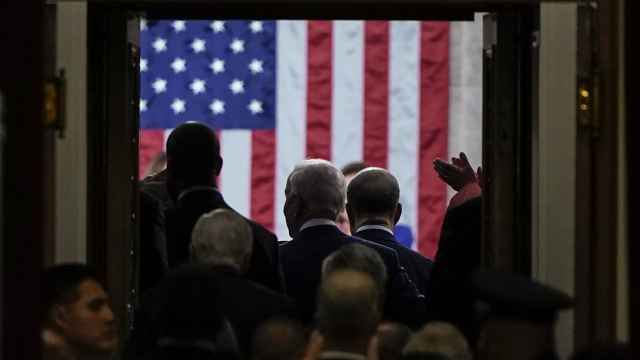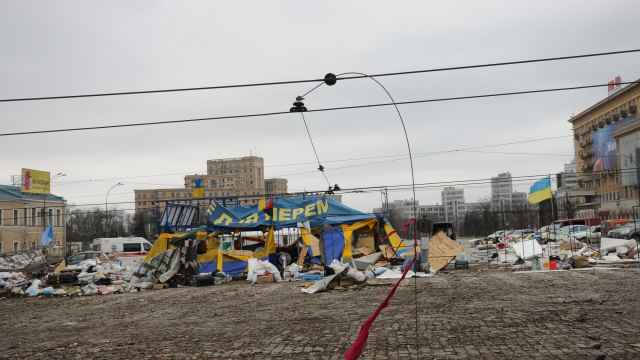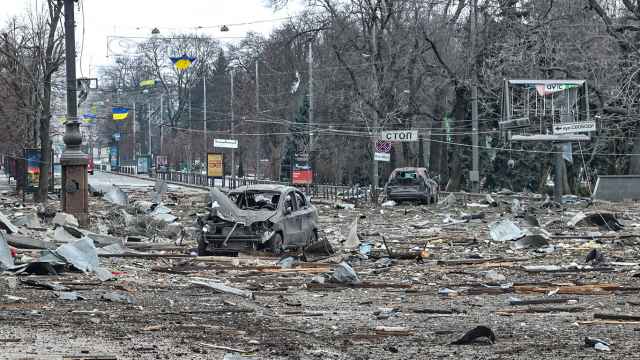It was hard to tell what scared the elderly women more: the piercing peal of air raid sirens or the terrified urgency of the Ukrainian soldier who ordered everyone to run for cover.
"Everyone! Immediately! Now!" the soldier screamed as he dashed in his heavy boots across a road scattered with the exploded remains of grenades and shells.
Behind him stood the charred skeleton of a Ukrainian military truck that was hit while ferrying ordnance to a flashpoint district of northern Kyiv.
Before him were elderly women with handbags and middle-aged men chatting about the war while blowing out cigarette smoke.
And above them — somewhere in the ominous distance — was the swooshing sound of either mortars or Grad missiles being fired in a barrage on Ukraine's capital.
The passers-by all ran around the corner of a building and down a dark flight of stairs leading into a concrete basement.
Already waiting for them was a sheltering group of exhausted people who had come desperately close to getting out of Kyiv on the third day of Russia's invasion of their country.
"We were trying to evacuate, but half-way down the road, they started shelling," IT engineer Helga Tarasova said.
She had taken a bus to Kyiv train station with her young son and several friends.
Their next stops were supposed to be the western Ukrainian city of Lviv and then — possibly — Poland.
"We only had 800 meters (half a mile) to go until the station," the 36-year-old recalled, while bouncing her son on her knee.
"But the national guard would not let us through. We were running with our bags and I think the bags scared them."
Shoot-on-sight
The Ukrainian capital is under siege.
It entered a weekend curfew on Saturday evening that is being enforced with shoot-on-sight orders.
Residents have started taping over exposed window panes and covering up street names, building numbers and other identifiable city markings to try to confuse the invading Russian force.
Queues running to dozens of cars deep snake around the few functioning petrol stations.
Grocery stores are either closed or packed with people staring at grimly bare shelves that are often out of bread and simple meats and cheese.
One soldier was digging a trench on the side of a highway that the Russian tanks are expected to use to push toward Kyiv's Maidan Square and the government district.
"We were hoping that our generation would be the one that lives without war," pensioner Tetyana Filonemko lamented, in the basement.
"All the people can do in a war is hold on, be as one, support each other. That's all we can do."
'Open a corridor'
Filonemko's basement is split into three rooms connected by a narrow corridor and lit by incandescent bulbs hanging off black wires.
One man slept on a yoga mat arranged atop a few wooden planks. A bucket stood beside him on a wooden stool.
Other men paced and some women whispered. The children seemed the least concerned in their play corner.
"All I can think about is the children," said Nadezhda Tkachuk.
The 58-year-old had just walked up the stairs and popped her head out of the door for a quick breath of fresh air — and to try to hear how close the fighting had come.
"Let them open a corridor, so that they don't shoot at people, so that we can send the little kids out," she said.
But Yulia Snitka has even more immediate concerns.
The 32-year-old's belly bulged through her clothes on the eighth month of pregnancy and she is worried about being worried.
"I'm trying to stay as calm as possible to not cause a premature birth," she said.
"At night, for more than an hour, there were huge explosions. I hope this all ends in a few days."
A Message from The Moscow Times:
Dear readers,
We are facing unprecedented challenges. Russia's Prosecutor General's Office has designated The Moscow Times as an "undesirable" organization, criminalizing our work and putting our staff at risk of prosecution. This follows our earlier unjust labeling as a "foreign agent."
These actions are direct attempts to silence independent journalism in Russia. The authorities claim our work "discredits the decisions of the Russian leadership." We see things differently: we strive to provide accurate, unbiased reporting on Russia.
We, the journalists of The Moscow Times, refuse to be silenced. But to continue our work, we need your help.
Your support, no matter how small, makes a world of difference. If you can, please support us monthly starting from just $2. It's quick to set up, and every contribution makes a significant impact.
By supporting The Moscow Times, you're defending open, independent journalism in the face of repression. Thank you for standing with us.
Remind me later.


